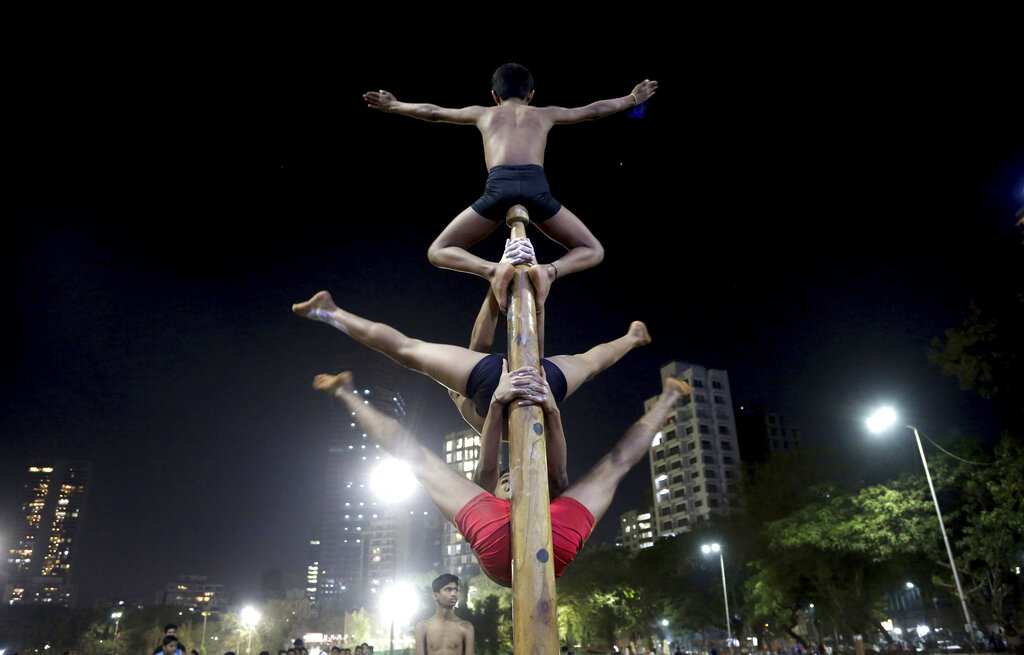
In this Feb. 6, 2019, photo, players perform on a mallakhamb pole at the Shree Samartha Vyayam Mandir at Shivaji Park in Mumbai, India. The word mallakhamb comes from malla, meaning wrestler, and khamb, or pole, and is a traditional training exercise for wrestlers in India. After centuries of being practiced in isolation in the subcontinent, mallakhamb is set to have its first international championship in Mumbai on Feb. 16 and 17. (AP Photo/Rafiq Maqbool)
MUMBAI, India — Is it gymnastics? Is it yoga? Is it even a sport?
Picture a person climbing a coconut tree. Now imagine the person twisting, turning, rotating and practicing yoga postures, all while firmly gripping the tree with the thighs. Mallakhamb is this and more.
Mallakhamb is a traditional training exercise for wrestlers in India, and its name comes from the words malla, meaning wrestler, and khamb, or pole.
Now after centuries of being practiced in isolation in the subcontinent, mallakhamb is set to have its first international championship this weekend in the capital of the western Indian state of Maharashtra, where it first originated.
In this Feb. 5, 2019, photo, a trainer helps Alfie Meeson of Newcastle, England, on a mallakhamb pole at Shivaji Park in Mumbai, India. The word mallakhamb comes from malla, meaning wrestler, and khamb, or pole, and is a traditional training exercise for wrestlers in India. After centuries of being practiced in isolation in the subcontinent, mallakhamb is set to have its first international championship in Mumbai on Feb. 16 and 17. (AP Photo/Rafiq Maqbool)
Like yoga, the time has come for mallakhamb to be shared with people across the globe, said Uday Deshpande, director and secretary general of the Vishwa Mallakhamb Federation
“Our goal is to inspire a new generation of sports fans who can experience the discipline, endurance and concentration required by this sport,” he said.
Deshpande says the sport has gained an international audience owing partly to reality television shows such as India’s Got Talent where mallakhamb performers have won popularity. Cirque du Soleil’s show Bazzar also features a mallakhamb performance.
In this Feb. 6, 2019, photo, Vikram Nadkarni, of Newcastle, England, performs a Mallakhamb pose on a pole at Shivaji Park in Mumbai, India. The word mallakhamb comes from malla, meaning wrestler, and khamb, or pole, and is a traditional training exercise for wrestlers in India. After centuries of being practiced in isolation in the subcontinent, mallakhamb is set to have its first international championship in Mumbai on Feb. 16 and 17. (AP Photo/Rafiq Maqbool)
Participants from 15 countries, including the U.S. and Germany, will compete in the championship.
In the evening, the historic Shivaji Park in Mumbai comes alive with mallakhamb players swirling around poles and on ropes, falling, only to get up and make another attempt.
International players have started arriving to train. Delia Ceruti, 36, an aerialist and physical performer from Italy, has been practicing mornings and evenings under Deshpande.
In this Feb 5, 2019, photo, a mallakhamb instructor Sachin Malekar, right, calms a child who made an unsuccessful attempt to climb the pole, at Shivaji Park in Mumbai, India. The word mallakhamb comes from malla, meaning wrestler, and khamb, or pole, and is a traditional training exercise for wrestlers in India. After centuries of being practiced in isolation in the subcontinent, mallakhamb is set to have its first international championship in Mumbai on Feb. 16 and 17. (AP Photo/Rafiq Maqbool)
“I am used to physically demanding activities but I am learning completely new techniques,” she said.
To broaden its international appeal, it helps that the gravity-defying mallakhamb doesn’t require much money or equipment. With only a rope or a wooden pole, it is an activity compatible in a village playground as well as the neighborhood gym.
In India, a country with some 800 million people living in poverty, that could be mallakhamb’s greatest strength.